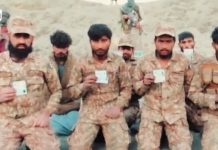Two major international human rights organizations, Amnesty International and Front Line Defenders, have issued strong condemnations of the ongoing ‘brutal violence’ by Pakistani state forces against human rights defenders and peaceful Baloch protesters attending the ‘Baloch National Gathering’ in Gwadar.
Front Line Defenders expressed grave concern over the violent crackdown on participants of the Baloch National Gathering held on 28 July 2024. The organization condemned the use of live bullets against unarmed civilians, which has resulted in numerous injuries and at least two deaths.
“The Baloch National Gathering is a peaceful event organized by the Baloch Yakjehti Committee to highlight ongoing human rights violations in Balochistan,” the statement read. The organization noted that human rights defenders and protesters are calling for an end to systemic discrimination, violence, and impunity in Balochistan.
The significance of Gwadar as the venue was also noted. “The choice of Gwadar, a port city in Balochistan, which has seen high levels of militarization and development-related displacement is significant as the region has experienced systemic human rights violations linked to the China-Pakistan Economic Corridor.”
Human rights defenders, including women, have been specifically targeted during the protests, Front Line Defenders said. There have been attempts on the life of prominent human rights defender Dr. Mahrang Baloch. On 29 July 2024, at least three human rights defenders, including Front Line Defenders 2024 award winner Sammi Deen Baloch, Dr. Sabiha Baloch, and Sibghatullah Abdul Haq, were reportedly detained by uniformed armed personnel. Their whereabouts remain unknown.
The organization also raised alarms about the fate of human rights defenders Hafeez Baloch, Seema Baloch, and 17-year-old Mahzaib Baloch, who have been missing since 29 July 2024. All three were last seen in Gwadar city, and there is presently no information about their whereabouts.
“In the weeks leading up to the Baloch National Gathering, members and human rights defenders associated with the Baloch Yakjehti Committee (BYC) faced reprisals by state authorities. The attacks included surveillance, raids, arrests, and false legal cases,” the statement added.
From 26 to 28 July 2024, major highways in Balochistan were blocked by the military using containers, heavy stones, and large trucks to prevent people from joining the Gwadar gathering. Transporters and passenger bus drivers were threatened and told not to transport attendees. Protesters and human rights defenders traveling to Gwadar from different parts of Pakistan, including within Balochistan, faced violence, arrests, and threats of arrest.
The statement also highlighted the blockade of internet, mobile, and landline access to Turbat, Gwadar District, and most recently Mastung District, reducing avenues for information sharing and access to much-needed support. The ongoing blockade of entry and exit points to Gwadar city has led to credible fears of shortages of food and other essential supplies.
Similarly, Amnesty International also condemned the repeated punitive crackdowns on Baloch protests. Babu Ram Pant, Deputy Regional Director for South Asia at Amnesty International, highlighted the systemic use of violence by Pakistani authorities against Baloch protesters.
“Every time Baloch protests take place, their demands are met with violence by security forces and mass arrests. We saw it in December last year at the Baloch Long March. We see it now again with the Baloch Raaji Muchi protests in what is clearly a punitive attempt by the Pakistani authorities to deter, vilify, and criminalize peaceful protesters,” Pant stated.
Amnesty International reported that on 27 July 2024, Frontier Corps personnel fired at people traveling to join the protests, injuring at least 14. Blockades were established across Balochistan to restrict movement, and an order under Section 144 banning public assemblies was imposed in Quetta. On 28 July, at least three protesters were killed by security forces in Gwadar and Talar, and dozens were injured.
The organization called for an end to the brutal crackdown and the immediate and unconditional release of all those arrested for exercising their right to peaceful assembly. It also criticized the roadblocks and shutdown of internet and mobile networks across Balochistan, which restrict movement and access to information.
“The reports of three deaths and the arrest of organizers, including Sammi Deen Baloch, Sibghatullah Shah, and Dr. Sabiha Baloch, are extremely concerning and indicative of the continuing decline in civil and political rights in Pakistan. Amnesty International calls for an end to the brutal crackdown on the Baloch protests and the immediate and unconditional release of all those arrested for exercising their right of peaceful assembly,” Pant added.
Both organizations are calling on the Government of Pakistan to cease the use of force against human rights defenders and peaceful Baloch protesters. They demand the immediate disclosure of the whereabouts of detained activists, including Sammi Deen Baloch, Dr. Sabiha Baloch, and Sibghatullah Abdul Haq, and guarantee their safety and release.
The international community is being urged to hold Pakistani authorities accountable for the ongoing human rights violations in Balochistan. Both Front Line Defenders and Amnesty International are calling for those responsible for the violence against human rights defenders and peaceful protesters, and for detaining and holding human rights defenders incommunicado, to be held accountable.





























